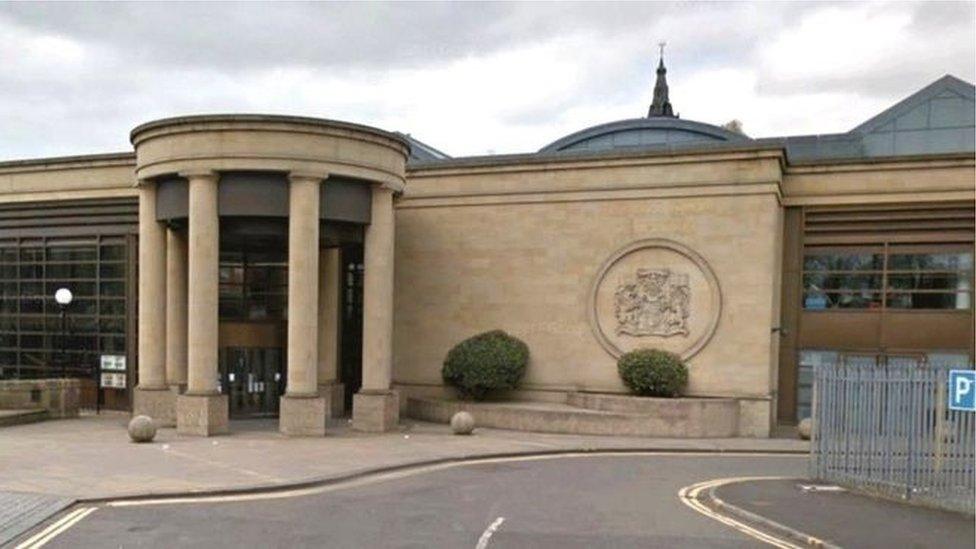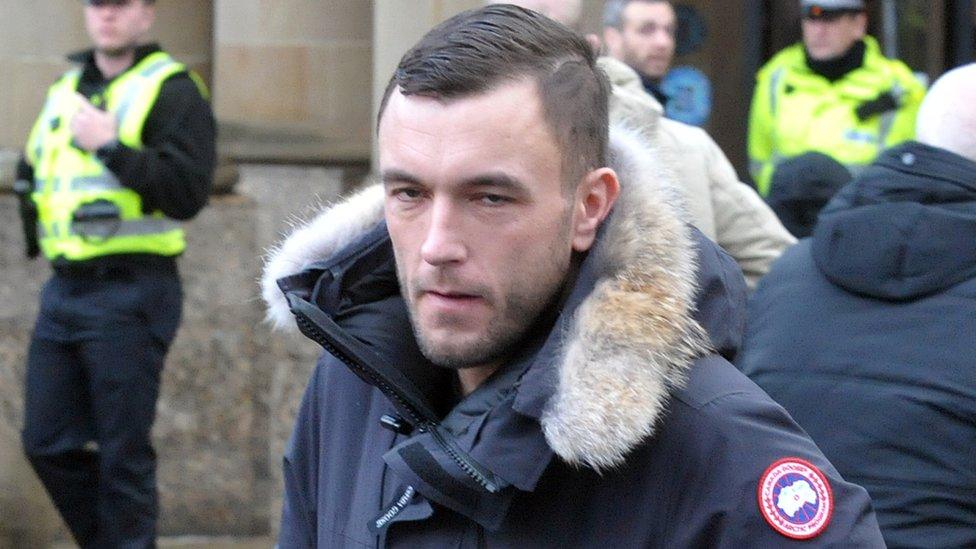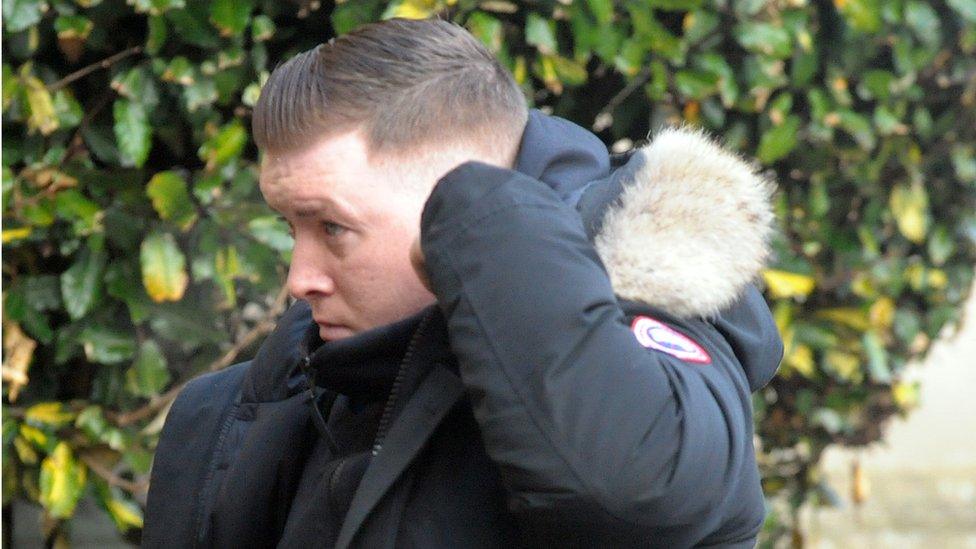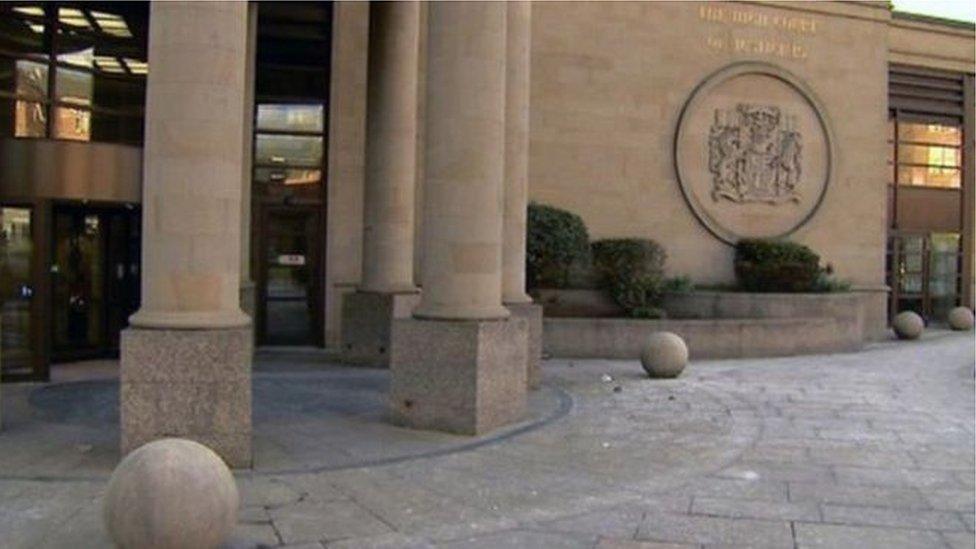Gang attack victim felt 'death was coming' during ambush
- Published

The court heard that Mr Fitzsimmons was attacked outside the home he shared with his mother in Clydebank
A former soldier was left brain damaged after being ambushed in the street by a masked gang.
Ryan Fitzsimmons told jurors at the High Court in Glasgow: "It felt like death was coming".
Mr Fitzsimmons, 34, was targeted as he got in his car in Clydebank, West Dunbartonshire, in April 2017.
He was giving evidence at the trial of six men accused of being part of the Lyons criminal gang which is said to have targeted the rival Daniel clan.
Brian Ferguson, 37, Andrew Gallacher, 40, Robert Pickett, 53, Andrew Sinclair, 32, John Hardie, 35, and Peter Bain, 45, deny the charges.
The witness told jurors he had "no enemies" and had never been in trouble with the police.
But the court heard his older brother, Martyn, was a convicted criminal and had once been charged with shooting a man called Ross Monaghan.
'Sword-like object'
The allegations include a string of attempted murders over a 15-month period.
It is alleged the men targeted Mr Fitzsimmons, Thomas Bilsland, Gary Petty, Robert Daniel, and Steven Daniel.
The charge spans between June 2016 and September 2017 listing locations in Glasgow, North Lanarkshire, Renfrewshire and Manchester.
Mr Fitzsimmons was attacked on 28 April, 2017 outside the home he shared with his mother.
He was a Sainsbury's delivery driver at the time having previously served in the armed forces with the Royal Engineers.
Mr Fitzsimmons told the court he was getting into his car to start a shift when another vehicle suddenly "zoomed" up right beside him.
He said: "Four of five people came out all in black. They were masked up.
"They came round the back of my car. I then saw a sword-like object coming towards me."
Mr Fitzsimmons recalled keeping his head down as he was set upon.
He told the trial: "I can remember vividly as if it (the weapon) was getting stuck in my head and that it was an effort to get it out.
"It was as if they were trying to chop the top of my head off. I was getting a kicking.
"I was trying to protect myself as much as I could. It felt like death was coming."
'Broken Easter egg'
The witness said the attack lasted "a few minutes" and he recalled the assailants saying nothing.
Prosecutor Paul Kearney asked: "What was going through your head at the time?"
He replied: "I did not think there was any way back for me."
He recalled his skull being like a "broken Easter egg".
As well as surgery on his head, Mr Fitzsimmons needed a plate inserted in his left arm and he continues to have issues with his right arm.
The court heard he was once a keen runner and had been training for the London Marathon.
But jurors were told he was now unable to live independently and required daily help from his mother.
He said: "I am not the same person. I am not outgoing and keep things to myself. I don't know who to trust."
Mr Fitzsimmons was asked if he had "any enemies" prior to the attack. He replied: "No, none at all."
The court heard he had also "never been involved in crime".
Heart attack
Mr Fitzsimmons was then quizzed about his brother Martyn.
He agreed with prosecutor Mr Kearney that Martyn had been convicted of "quite serious firearms offences".
Mr Fitzsimmons mother Geraldine, 61, later recalled the "horrible" scene she was faced with after returning home from a shopping trip.
She was told by police her son had been attacked and that people were "holding towels to his head".
Mr Kearney asked her: "You took unwell at that point - what happened?"
She replied: "I took a heart attack."
Mrs Fitzsimmons ended up joining her son in hospital and it was days later before she was allowed to see him.
She said: "He was terrible. He was just lying there. It was not nice."
The mother added her son had "always been a good boy".
An A&E consultant later told the court Mr Fitzsimmons' CT scan showed a skull fracture and bleeding on the brain.
Dr Shabir Ahmad said the former soldier underwent brain surgery and required a blood transfusion.
The trial, before Lord Mulholland, continues.
- Published25 January 2019

- Published24 January 2019

- Published23 January 2019
